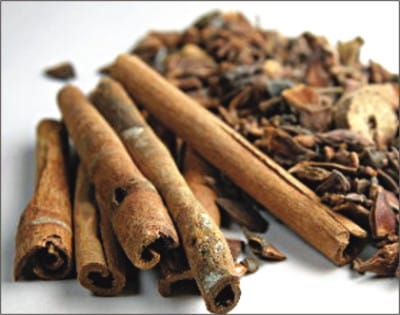Fascinating facts of cinnamon

Cinnamon has a long history both as a 'masala' (spice) and as a medicine. It is the brown bark of a small tree that is commonly found in South Asia, China and the Middle East some times.
The two most popular types of cinnamon are Ceylon and Cassia, each of which is derived from different trees. In traditional medicine, cinnamon has been used for digestive ailments such as indigestion, gas and bloating, stomach upset, and diarrhoea.
More recently, modern medical research has turned its eye on cinnamon and is coming up with some fascinating results. Cinnamon has high anti-oxidant activity, and the oil of cinnamon has anti-bacterial and anti-fungal properties. It is also a great source of manganese, fiber, iron and calcium. As a result, it has been used as an useful remedy for reducing blood sugar levels and treating Type 2 Diabetes and lowering cholesterol.
Chinese medicine has long used cinnamon as a natural medication for common cold and coughs. Some experts believe that the health benefits of honey and cinnamon include a strong immune system, digestive system, healthy teeth and hair and weight loss. It helps in getting relief from itching and arthritis.
Some recent European studies have shown that cinnamon derived from the Cassia plant contains a toxic compound known as 'coumarin'. This compound is known to cause liver and kidney damage in 'high concentrations'. Since the powdered cinnamon that we purchase in our markets and superstores is normally derived from the Cassia plant, it is important to avoid consuming high doses of it. Caution should also be exercised when it is used in combination with other blood-thinning products such as 'Aspirin' as cinnamon has an anti-clotting effect on the blood.
Large quantities of cinnamon should also be avoided during pregnancy due to the possibility of adverse effects on the uterus. Recent studies have shown that consuming small amounts of cinnamon is good; eat half a teaspoon of cinnamon powder daily. It can be added as a mild sweetener to coffee or tea as well.

 For all latest news, follow The Daily Star's Google News channel.
For all latest news, follow The Daily Star's Google News channel. 



Comments